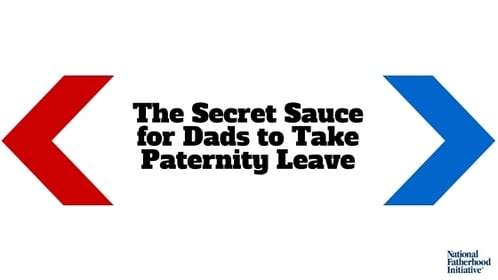The Secret Sauce for Dads to Take Paternity Leave
3 min read
Date Published: 03/01/2016
Last Updated: 03/01/2016
National Fatherhood Initiative Blog / Latest Articles
3 min read
This post originally appeared on The Huffington Post.
In a previous post in this blog, I wrote about Netflix's new parental leave policy that gives new parents up to one year of paid leave upon the birth or adoption of a child. While we should applaud Netflix for that policy, I noted that it lacks the teeth necessary to encourage dads to take advantage of it.

The reason it lacks teeth is that dads require efforts that speak specifically to them --that meet their needs and wants as dads broadly and within the context of work-family balance. Dads are much less likely than moms to take parental leave. While 90 percent of dads in the U.S. take some time off from work upon the birth or adoption of a child, most of them take a week or less off.
To speak directly to dads, I encouraged Netflix to create a campaign -- an internal marketing campaign -- that encourages dads to take advantage of this policy. Furthermore, I provided some specific suggestions for elements of the campaign. One of those elements is to use dads as spokespersons to deliver the value proposition for taking leave that will resonate with dads.
Therein lies the secret sauce to get dads to take paternity leave. It's called social proof, one of the primary ways to persuade any individual or group to take an action that will benefit them in the short or long term. Social proof states that people use the behavior of other people in a given situation to identify what is acceptable or correct for their own behavior. Dads will be more likely to take paternity leave (or parental leave depending on the term a company uses) when they see more dads take it. Dads who take paternity leave will snowball, as more social proof exists that it is acceptable to do so. Eventually, the social proof will transform into a social norm in American culture.
But how and when will we reach the tipping point for this transformation? That's a good question for which I don't have an answer. But it will certainly require at least the following elements:
I'm optimistic we can reach a tipping point. When Norway extended their parental leave policy a little more than two decades ago to include four additional weeks of leave specifically for dads, the rate of dads who took leave skyrocketed from a mere 3% to 35%, especially in blue-collar industries. Since then, the rate has continued to build to 70%. In California, five years after the state instituted a paid parental leave program in 2004, 25% of California dads took advantage of it, an increase of nearly 50% during that time.
The bottom line is this: dads are only human. They need the social proof that can come only from an environment that supports the most vital role they will ever play, that of raising the next generation of Americans and for whom taking paternity and maternity leave will never be in question.
This post originally appeared on The Huffington Post.Date Published: 03/01/2016
Last Updated: 03/01/2016
Download this free guide for a proven 7-step roadmap—from making the case and securing funding for your program, to launching and measuring real results!


Train Your Staff
Fatherhood Programs
Fatherhood Data
© 2026 National Fatherhood Initiative®. All rights reserved.